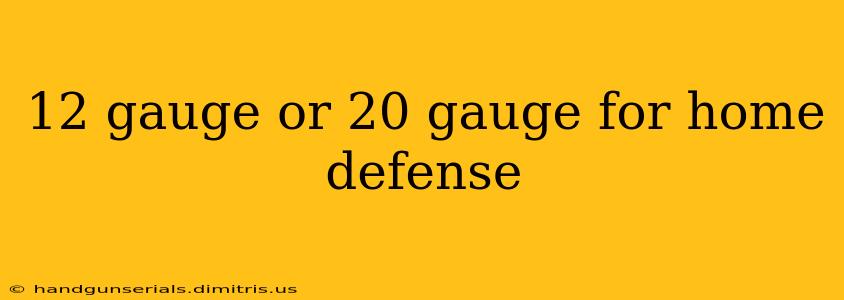12 Gauge vs. 20 Gauge for Home Defense: Choosing the Right Tool for the Job
Choosing a firearm for home defense is a serious decision, demanding careful consideration of various factors. One key aspect is caliber selection—specifically, the debate between a 12-gauge and a 20-gauge shotgun. Both offer advantages and disadvantages, and the "best" choice hinges on the individual user's capabilities and specific needs. This article will delve into the crucial differences to help you make an informed decision.
The 12 Gauge: Powerhouse Punch
The 12 gauge is the undisputed king of shotgun calibers, renowned for its immense stopping power. Its larger shell capacity translates to significantly more energy delivered per shot. This translates to:
- Greater stopping power: The larger shot payload and higher velocity deliver a devastating impact, increasing the likelihood of stopping a threat quickly.
- Effective range: While shotguns are generally considered short-range weapons, the 12 gauge maintains effectiveness at slightly longer ranges than the 20 gauge.
- Wide availability of ammunition: Finding 12-gauge ammunition is significantly easier than finding 20-gauge, a crucial consideration in an emergency.
However, the 12 gauge's power comes with trade-offs:
- Recoil: The substantial recoil can be challenging for smaller or less experienced shooters, potentially hindering accuracy and follow-up shots.
- Weight: 12-gauge shotguns tend to be heavier, making them less maneuverable in tight spaces common in home defense scenarios.
- More pronounced muzzle rise: The stronger recoil contributes to greater muzzle rise, impacting accuracy.
The 20 Gauge: A Lighter, More Manageable Option
The 20 gauge offers a compelling alternative, providing a balance between power and manageability:
- Reduced recoil: The lighter recoil makes the 20 gauge easier to handle, especially for smaller individuals or those new to firearms. This leads to better accuracy and faster follow-up shots – critical in a self-defense situation.
- Lighter weight: The reduced weight improves maneuverability, crucial when navigating tight corridors or stairs within a home.
- Less muzzle rise: Lower recoil results in less muzzle rise, enhancing accuracy.
Despite its advantages, the 20 gauge presents certain limitations:
- Less stopping power: While still potent, the 20 gauge delivers less stopping power than the 12 gauge. This means more precise shot placement is crucial for effective neutralization of a threat.
- Ammunition availability: While readily available, 20-gauge ammunition is not as widely stocked as 12-gauge, although this is improving.
- Potentially limited range: Effective range is shorter compared to the 12 gauge.
Beyond Caliber: Crucial Considerations for Home Defense
The choice between 12 gauge and 20 gauge is just one piece of the puzzle. Other crucial factors influencing your home defense firearm selection include:
- Your physical capabilities: Honest self-assessment of your strength, experience, and ability to handle recoil is paramount.
- Your training level: Regular practice and training are essential, regardless of the chosen caliber.
- Shot type selection: The type of ammunition (buckshot, birdshot, slugs) significantly impacts effectiveness and recoil.
- Shotgun type: Pump-action, semi-automatic, and even break-action shotguns each have their pros and cons.
Conclusion: The Best Choice is Personal
Ultimately, the ideal home defense shotgun depends on the individual. A smaller, lighter person might find the 20 gauge easier to handle and control effectively, prioritizing accuracy over sheer power. A larger, more experienced shooter might prefer the 12 gauge's raw stopping power. Thorough research, professional guidance, and hands-on experience with both calibers are highly recommended before making this crucial decision. Remember that responsible gun ownership includes proper training, safe storage, and adherence to all applicable laws and regulations.

